A Marine’s guide to surviving deployment aboard a Navy ship
- By Tory Rich
Share This Article
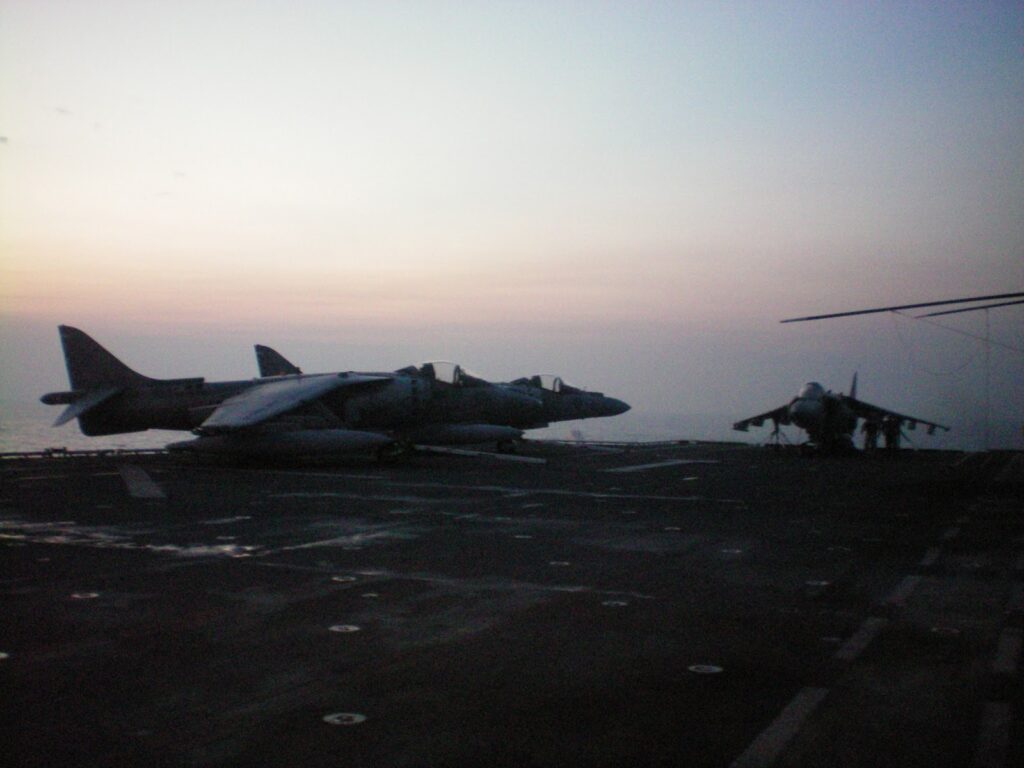
So you’re a Marine headed out on your first ship-based deployment and you’re wondering what life at sea with the Navy will be like. Your unit will likely give you a packing list, and there are sure to be a few salty dogs kicking around to give you some (hopefully) good advice from the voice of experience. There’s really no way around this: life on the boat is often boring, cramped, smelly, and just plain weird. It’s an experience like no other I’ve had, though. Like most things in life, it is what you put into it.
While I only have one deployment with the 11th Marine Expeditionary Unit (MEU) in 2008 to draw from, I picked up some valuable lessons in that seven months aboard the USS Tarawa. I learned a few of these things the hard way so that hopefully you won’t have to. This is my very basic guide to surviving life aboard a Navy vessel.
Get some sunshine
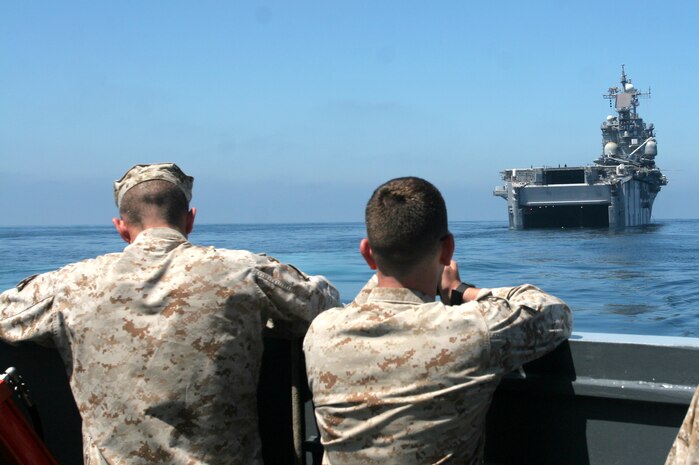
The ship is a dark place. I mean that only in the sense that a lot of the ship is poorly lit, but things can get emotionally dark pretty quickly as well if you don’t get out and see the sun. If you’re aboard a Landing Helicopter Assault ship (LHA) like I was, there are flight operations in progress for much of the day and you can’t go anywhere near the flight deck.
That being said, the flight deck is open for PT early in the morning most days. Plus, there are different spots around the ship that have openings where the sun touches if you go at the right time. Sometimes I would volunteer to bring our trash down to the compactor just because it was on the side of the ship and had access to some open air.
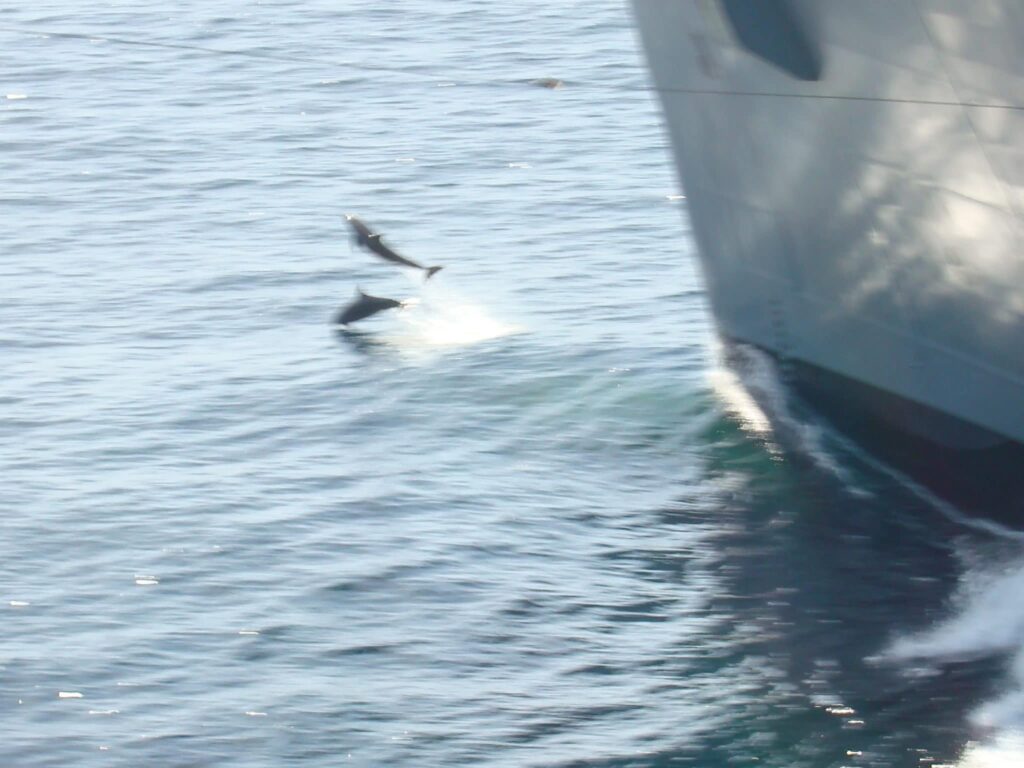
Dolphins following us while we dump the biodegradable trash overboard
If you don’t make a point to get out for some fresh air, it won’t be long before it feels like midnight around the clock and your Circadian rhythm is completely out of whack.
Go to the gym
If these first two items sound more like “how to deal with seasonal depression, you aren’t wrong. Getting enough exercise doesn’t just make sense from a vain and/ or career-oriented perspective (even though I’m definitely both of those things). The mental health benefits can’t be overstated, either. You’ll deal with bouts of cabin fever on steroids from time to time, so PT of some kind is an important event to add to your daily routine. Hit the treadmill, run up and down the ramp to the flight deck a few times, do some pushups, Tai Chi, yoga, anything – just get up and move. You’ll thank yourself later (when you aren’t wheezing going up a ladderwell).
While it’s true some smaller ships don’t have much more than the gym at a Motel 6, you learned at boot camp that there are plenty of ways to haze yourself with nothing but your own body and good old-fashioned gravity. So, no excuses! Speaking of gravity: lifting in the weight room when the ship is in choppy seas is something you have to experience at least once. You can go from bench pressing on the moon on one rep to feeling the crushing weight of all your past failures combined on the next. It’s fun. Just bring a spotter.
Don’t skip chow
There’s no use sugar-coating it. The food on the boat generally isn’t very appetizing. Well, there was that one time that someone in the galley ordered 3,000 units of chicken cordon bleu instead of 300. That week wasn’t the worst (except now I can’t go to a wedding or a banquet without having flashbacks). No, the food isn’t going to win any awards, but it will keep you alive.
The thing is, there is just a greater chance of you getting sick while on you’re on the ship. You’re living in some pretty cramped quarters and I don’t think anyone needs a lesson right now on how viruses spread. There aren’t many things that can do more to suppress your immune system than a consistently poor diet (maybe poor sleep and exercise habits? See above). The temptation will be strong to avoid the long lines and sleep through chow only to eat your third Powerbar of the day, or hit up the vending machine later on. Don’t give in! Geedunk rhymes with junk for a reason (maybe?).
Besides that, chow is a great time to interact with some people other than your normal work center. No matter how much you like the people you work with, at some point you’ll be ready for a break from them. Chow time on the boat is kind of like in high school where you could sit with the friends you didn’t have any classes with.
Volunteer for working parties. Make some friends
Yes, I said volunteer for working parties. You’re right, Season 2 of “The Office” is the best season, but there’s only so much that be gained between your fourth and fifth time re-watching it. Instead, get out of the berthing area (Navy for “barracks” on a ship to the uninitiated) and go make yourself useful.
I was part of something called combat cargo on my deployment. Essentially, combat cargo is the group of Marines that loads and unloads shipping containers, equipment and vehicles on the ship. We worked pretty much around the clock before or after most port calls, but had even less to do than most Marines on board once we were underway. So we were usually the first place higher-ups came for working parties, at-sea replenishments, and odd jobs.
I tended to hop right up for little tasks like this, not because I was such a go-getter, but because I needed something to occupy my time. This paid off a couple of times, though. A few guys from the LCAC (Landing Craft Air Cushion) crew would come up to our berthing area periodically and ask us for help moving vehicles off their decks so they could clean them off. One day, the petty officer who was the LCAC crew leader came into the berthing area looking for the usual suspects.
I saw him and said, “I got you, be down in a few.”
“Nah man, you want to go for a ride?”
That was probably the fastest I moved the entire deployment. If you’re not familiar, an LCAC is basically a giant fan boat that hovers on a cushion of air and is used for amphibious landings. They’re big, they’re loud, and – most importantly – they’re fast, with a maximum speed of 70 knots (about 80 miles per hour). Here’s a video of one in action:
So the moral of the story is: make some sailor friends. I’m all for a little friendly inter-service rivalry, but it’s their boat, after all. Most of them know the ship inside and out. They know all the spots to go if you want to hide from everyone for a nap and they might have a way to hook you up with some better chow or first dibs on something in the ship store. So be cool!
Pick a good liberty buddy
This goes for any time you’re out on liberty, of course, but goes double for when you’re in a foreign country. You think you know someone pretty well after being forced to spend that much time together, but freedom and feet on dry land can make for a Dr. Jekyll-Mr. Hyde effect. Try to pick someone who talks more about doing dorky tourist things and seeing the sights over the guy who can’t wait to have a drink. I’m not saying you shouldn’t enjoy yourself and have a few while you have the chance, but when’s the next time you’re going to be in Australia? Don’t you want to remember it?
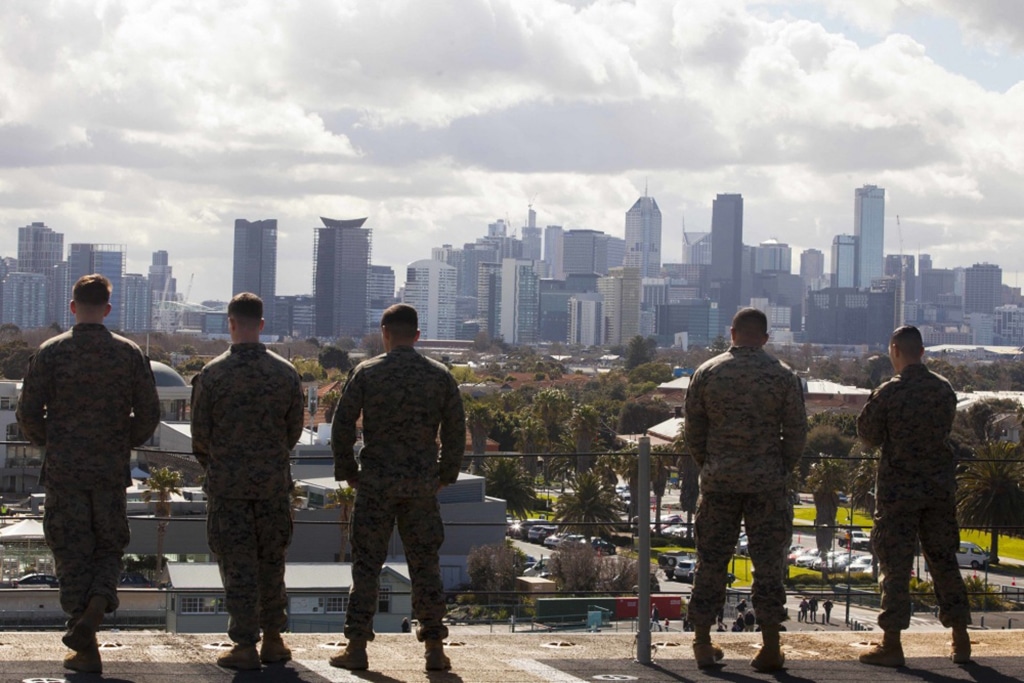
About halfway through the MEU, we made a port call in Jebel Ali, near Dubai, and there were busses there to shuttle us out to the massive Dubai Mall. As you may have guessed, my two liberty buddies decided to partake in way too much alcohol, and I was left babysitting. As we were on our way back to the bus, they got in a fight over something and drew the attention of a security guard. 13 years later? Sure, just a funny story now. But in that moment, I remembered our safety brief about how strict the police were and was imagining life in an international prison.
This isn’t an after-school special. Enjoy yourself on liberty. Just pick someone that’ll allow you to get the most out of your time in port and be smart.
Don’t stress seasickness too much
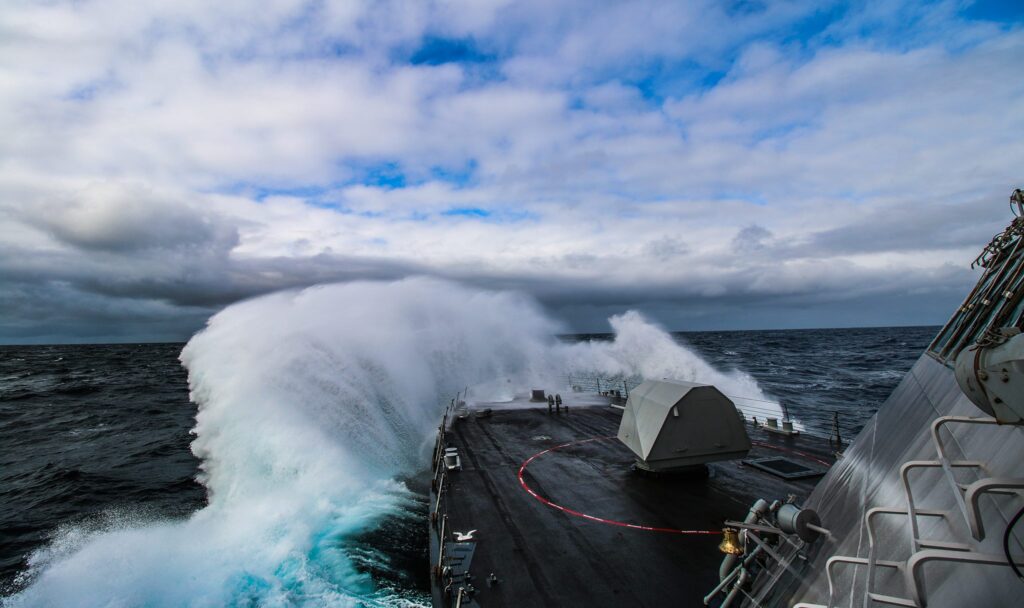
If you haven’t spent much time on a boat, it can take you a few days to get your “sea legs.” An unlucky few do struggle with seasickness, but after observing myself and most others, your body adjusts fairly quickly. You get used to your equilibrium constantly being thrown off and you learn to stay close to the trusty bulkheads while you’re walking anywhere. The boat can definitely get rocking when you hit rough seas. Granted, the Tarawa was a larger ship, so the waves don’t throw a boat like that around as much, but seasickness was rarely a problem for me.
For the few that I knew that had an issue with it, it didn’t last long. If you are prone to it, there’s always Dramamine to get you through that first rough patch. For an even unluckier few, Dramamine and other motion sickness medications don’t help, but that is rare.
Be prepared!
Keep in mind, space is limited–very limited. You’ll have a locker to store your valuables and everyday items, and then your seabag with the lesser-used things (you won’t need your woolly pully near the equator) will likely be stowed away in a closet somewhere. You’ll be sleeping in racks that are stacked three or four high on top of each other. So just like when you were five (or 25, no judgment here), call the top bunk! It’ll give you another foot or two of headroom.
I recommend packing some non-perishable foods to snack on to get you through the first month or two. Beyond that, ask your loved ones to include protein bars, trail mix, nuts, dried fruit, and anything else that will keep in their care packages.
The internet situation while afloat has improved in the 13 years since I was on the MEU, but not much. Internet is still nothing close to what you’re accustomed to at home. You won’t be binge-watching Netflix. I would suggest downloading a lot of content on your laptop, and it couldn’t hurt to get a cheap portable DVD player and raid the bargain bin at Wal-Mart. Bring backup chargers for your electronics. Everyone and their mom will be electricity-dependent, so bring your own personal power strip or your phone and laptop might be fancy paperweights before long.
Keep in mind that the ship will occasionally be in “River City,” slang for when the ship is in a state of “Reduced Communications.” Only classified channels can communicate, which means you won’t be able to send emails or check Facebook. This can last a few hours or a few weeks, depending on how long operational security is required. So bring a few books and magazines, and learn how to play spades. Those squids know all the card games.
Remember, it’s worth it
I’ve done a lot of griping about life on the ship, but I wouldn’t trade those seven months for anything. I took two college classes. I went through Corporals Course. I earned a Humanitarian Service Medal for the aid we gave to Bangladesh after a cyclone hit in November of 2007. I went to a zoo in Singapore. I almost got arrested in Dubai. I got to see the coast of Kenya. I walked next to domesticated kangaroos in Perth, Australia. I was welcomed into a private party and drank with the locals in Tasmania. I was in Pearl Harbor on Memorial Day and walked on Waikiki Beach.
Again, life on the boat is what you make it. Try to remember that everyone else on the ship is going through the same things you are, maybe more. People will be nasty and rude. Try to be the person that breaks the tension instead of adds to it. Make sure for every moment where you’re saying to yourself, “This sucks,” that you’re also taking a moment to look around you and ask, “When am I ever going to see something this cool again?”
The opportunities are there if you look for them.
Related Posts
Sandboxx News Merch
-

A-10 ‘Thunderbolt Power’ Poster
$22.00 – $28.00 Select options This product has multiple variants. The options may be chosen on the product page -

F-35 ‘Lightning’ Poster
$22.00 – $28.00 Select options This product has multiple variants. The options may be chosen on the product page -

F-35 ‘Evolution’ Poster
$22.00 – $28.00 Select options This product has multiple variants. The options may be chosen on the product page
Tory Rich
Tory Rich is a Marine veteran, and now coaches football and wrestling, so he spends most of his time lecturing younger people about “back in the old days.” Fortunately, there aren’t a lot of kids to tell to get off his lawn deep in the woods of Vermont. Since he got out of the Marines in 2011, Tory got a bachelor’s degree in Kinesiology from UNLV. While he lived in Las Vegas he dabbled in powerlifting and learned just enough about mixed martial arts to get his butt kicked.
Related to: Military Affairs

What it’s like to visit Korea’s Demilitarized Zone

Space Force to deploy new jammers to yell at enemy satellites

Ukraine peace negotiations don’t look promising
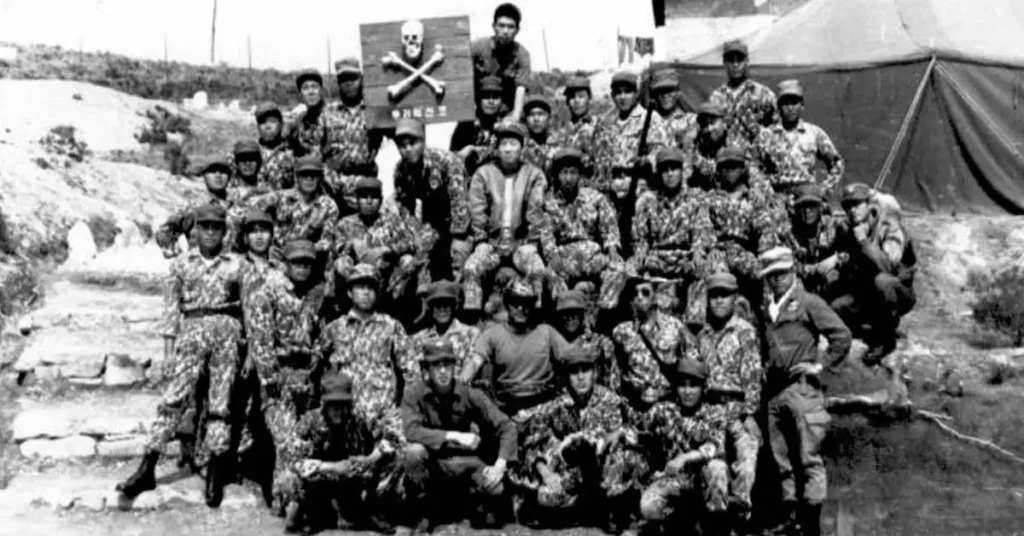
Unit 684 – The South Korean suicide squad with the tragic history
Sandboxx News
-

‘Sandboxx News’ Trucker Cap
$27.00 Select options This product has multiple variants. The options may be chosen on the product page -

‘AirPower’ Classic Hoodie
$46.00 – $48.00 Select options This product has multiple variants. The options may be chosen on the product page -

‘AirPower’ Golf Rope Hat
$31.00 Select options This product has multiple variants. The options may be chosen on the product page -

‘Sandboxx News’ Dad Hat
$27.00 Select options This product has multiple variants. The options may be chosen on the product page
